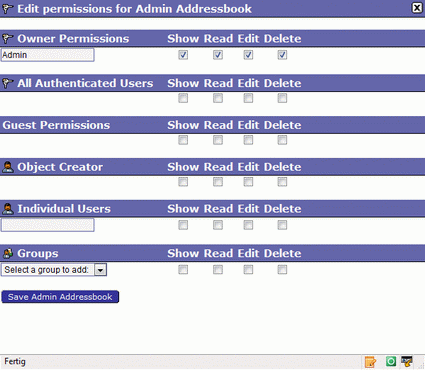4 OpenSource Groupware Tools
Notes, Address Books, Tasks, And E-Mail
Horde's notes feature "memo" is fast and reliable. While you create your notes, you can categorize them as well, and those categories are also accessible via other modules. If you want to distinguish categories visually, simply assign colors to each of them.
Horde Groupware's address book is called "Turba", a flexible feature with regard to the back end. It not only saves contact data to an SQL server, it also tethers a LDAP server, storing and providing contact data throughout the company. You can easily create new address books via the web interface and make it accessible for certain users and user groups. You can also add user-defined fields to save additional contact information. Adjusting the contact overview individually is almost mandatory; Turba also supports the import and export of CSV and vCard files.
"Nag" helps you to administer tasks, and is as easy to handle as Kronolith; you can create and categorize tasks in little time. The overview lets you decide whether you want to see all tasks, only completed tasks, or ones not yet accomplished. It is also possible to create more task lists, as well as to assign task list rights to particular users or user groups. Organizing your task lists by priority, category, and deadline is self-evident.
The IMP email client is very well designed. IMP is used by larger Internet providers, enabling their customers to access email via the web. Thus, IMP appears absolutely reliable and includes extensive functionality; it has proven to be a good email client for IMAP mailboxes. IMP also supports messages signed or encoded with PGP or S/MIME, for both sending and receiving. There is one requirement, though: either the public or private key needs to be deposited in the address book, together with the name of a sender or recipient. IMP needs to be activated via a secure SSL connection, supports several identities and comes with integrated email account accessibility. Substantial filter options will file away messages you have received into appropriate folders.
Via SyncML-protocol and Funambol's Outlook plugin, you can synchronize Horde in the same manner as eGroupWare. You simply need to adjust the plugin to synchronize calendars, tasks, and address book completely hassle-free.
Conclusions
Microsoft Exchange is not going to start getting the jitters when faced with the four groupware solutions we introduced above. Nonetheless, the functionality range of this OpenSource software is quite impressive, presenting an interesting alternative for small and mid-sized businesses. Synchronization features are still in their swaddling clothes, and web-based groupware could be the only serious disadvantages on the way to the top. With regard to the administration of emails, contacts and tasks in businesses, Outlook is still the de facto standard.
The performance of these OpenSource applications was positive in every respect. If you know how to handle databases and webservers, you will definitely complete the installation within minutes, though Horde would be an exception. With regard to operability and the range of functionality, we definitely think that both Horde and eGroupWare made the best impression.
Get Tom's Hardware's best news and in-depth reviews, straight to your inbox.
Current page: Notes, Address Books, Tasks, And E-Mail
Prev Page Horde Groupware Webmail Edition 1.0-
Faruq Hasan good write-up. Have you tried Simple Groupware ? Rather, please try sgsML and create a module of your own, and then advise what you think of it. 6mb groupware with all of what you say is missing above.Reply
Cheers.

